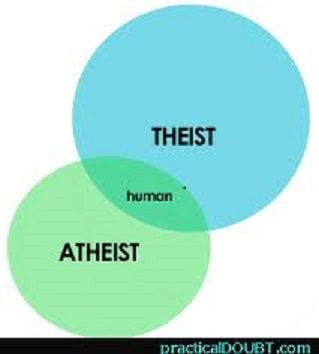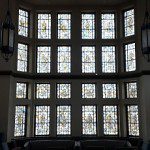I often tell my students that they have to “earn the right to have an opinion.” That right is earned by being able to support one’s opinion with evidence, as well as by the willingness to engage fairly with opinions other than one’s own. There is no arena in which people fail more regularly to earn their opinions than the arena of religious belief. This is one of the reasons the first chapter in my recently released book, Freelance Christianity (check it out on the “publications” page!), is “Atheism–My Invisible Friend.” As a theist, I am required to know the arguments that atheists offer against theism (there are many of them); perhaps even more importantly, I need to be open to learning from my atheist friends and colleagues (I have quite a few!). One’s argument is never made stronger by ignoring the other side.

Simone Weil writes that “Atheism is a purification.” Not where I come from. No word or phrase was more mysterious or terror producing for a young Baptist boy than “atheist.” I certainly didn’t know any, nor did my parents, nor did anyone in my extended family, nor did anyone who attended our church. But none of us knew any serial killers, either. I came to suspect that atheists were mythical creatures like unicorns and Big Foot, until one day I heard my aunt Gloria, who had a very loud voice, whispering to my mother in the next room about the new high school science teacher. “He spends a lot of time teaching evolution; I’ll bet he’s a practicing atheist.”
What exactly does that mean–“a practicing atheist”? Is that someone who is very serious about atheism, who has gone beyond the lazy “God doesn’t exist” verbal stage and is actually putting this stuff into action? Does one practice atheism as I practiced the piano as a child, in hopes of becoming a concert atheist? Does the “practicing atheist” try it out for a while to see how she likes it? Given my general obsession with the “God question,” maybe practicing atheism for a while would be good for the health of my soul, just as vegetarianism would be good for my bodily well-being.
Practicing atheism would put an end to creating God in my own image. I have known many gods in my lifetime, and every one of them is either a projection of myself or of the person(s) who introduced me.
- A now silent God who stopped communicating directly with human beings several centuries ago, once the dictation of the divine word in print was finished.
- A God who invites into the inner sanctum only those who have a special “prayer language.”
- A God who “is not willing that any should perish, but that all should come to repentance,” but who at the same time is so judgmental and exclusive that the vast majority of the billions of human beings who have ever lived will end up in hell.
- An arbitrary God whose ire will be raised by the consumption of meat on Fridays during Lent, but who does not particularly care about pre-marital sex.
- An exclusively masculine God.
- A God who is more concerned with the length of male hair and female skirts than with the breadth and depth of one’s spiritual hunger and desire.
- A God whose paramount concerns are one’s positions on sexual orientation, abortion, or universal health care.
- A God who micromanages every detail of reality at every moment, including tsunamis, birth defects, and oil spills.
- A God who is able to do little things (like finding followers parking spaces) but not big things (like stopping tsunamies and earthquakes).
- A God who is more honored by self-reliance than by compassion for those in need.
And many more. As a practicing atheist I might still have anthropomorphic issues,but an anthropomorphic God would not be one of them.
Practicing atheism would be an effective antidote to any remaining obsession from my youth with what happens after physical death. We all sang songs about what a day of rejoicing it will be when we all get heaven. As a child I thought that the only reason to become a Christian was to get an ironclad fire insurance policy from hell. We used to sing “This world is not my home, I’m just a-passin’ through; If heaven’s not my home, then Lord what will I do?” Maybe I should love this world that is my home, one that I only get to live in for a short while. This is the world I’ve been given.
Atheism would provide me with new tools to apply to the problem of suffering and evil. Once I stop wondering why God allows the innocent to suffer, the guilty not to suffer, earthquakes to obliterate thousands, and the world generally to operate contrary to my wishes, the landscape looks quite different. Suffering exists—so does evil. The practicing atheist cannot ask “Why doesn’t God do something about this?” and asks instead “What does this require of me?” A fresh look at my world without God-tinted lenses reveals that suffering and violence are inextricably tangled with beauty. The waves on the ocean are no less beautiful because we know that sometimes people are drowned in them. A practicing atheist recommends a certain Stoic embrace of reality, rather than a childish affirmation of the parts I like and an impotent resistance to those I don’t.
Atheism would make it much more difficult for me to seek false consolations for disappointments, difficulties, and perceived injustices. I am reminded, year after year, that a significant majority of my students, most of whom are parochial school educated, believe that consolation is the only real reason to believe in God. But consolation, although emotionally attractive, is almost always an attractive lie. If my only response to human pain, mine or someone else’s, is that “the sufferings of this present time are not worthy to be compared to the glory that shall be revealed in us,” then pretty soon I become incapable of even seeing much of the suffering around me. There are times when Albert Camus’ project in “The Myth of Sisyphus,” “to see if I can live without appeal,” has to be my project. What if this is all there is? What if the only responses available to suffering and pain are ours? What if I don’t get to pass the buck on to the divine?
“Atheism is a purification” is not a call to become an atheist. Rather, for me a serious season of practicing atheism would serve as a purgative, a process of spiritual cleansing, eliminating loose vocabulary, sloppy habits, and lazy certainties which dull my spiritual sensibilities. If my Christian faith means anything, it means God in the flesh, incarnated in all features of this difficult, troublesome, exhilarating and precious world that is a divine gift. Christianity will not be fully incarnated until it is joined with a respect and reverence for this world. Practicing atheism can help. As Simone Weil writes, “Let us love this country of here below. It is real; it offers resistance to love. It is this country that God has given us to love. He has willed that it should be difficult yet possible to love it.”













